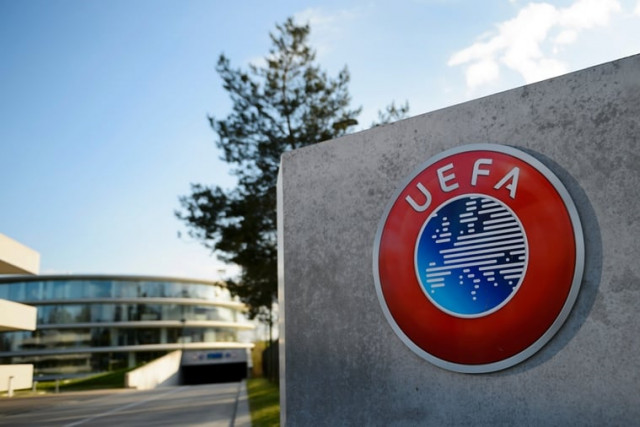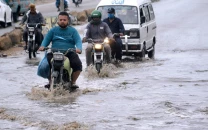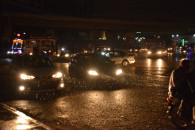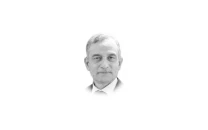Swiss police search UEFA offices in Panama Papers fallout
Raid came a day after Iceland's prime minister stepped down after being named in the scandal

PHOTO: AFP
The raid came a day after the so-called Panama papers claimed their first major scalp when Iceland's prime minister stepped down after being named in the massive leak of 11.5 million documents linked to a Panamanian law firm.
The Panama Papers also revealed that newly elected FIFA president Gianni Infantino had signed TV rights contracts for the Champions League with a company headed by two defendants later caught up in the corruption scandal that engulfed football's world body.
Gianni Infantino wins FIFA presidency
Infantino, who was UEFA's legal director at the time, did the deals for the 2006 and 2007 tournaments with Argentinian TV rights specialists Hugo and Mariano Jinkis, told AFP he was "dismayed" by the claims and denied any wrongdoing.
The father and son team are fighting extradition from Argentina to the United States where prosecutors allege they paid tens of millions of dollars in bribes to win various contracts.
The Panama Papers claimed another scalp on Wednesday when Uruguayan Juan Pedro Damiani resigned as an ethics judge for world football body FIFA after he was also named in the leaks.
Panama leaks: Nawaz should resign, says Wattoo
Reflecting a heightened focus on tax rules, US pharmaceutical giant Pfizer abandoned plans for a $160 billion (140.5 billion euro) merger with Ireland's Allergan, citing new US regulations to crack down on tie-ups aimed at making fiscal savings.
The decision to call off the deal to create the world's largest pharmaceutical company came after the US Treasury announced new rules this week to block "inversions", by which US firms merge with companies in countries with lower tax rates.
France led global pressure on Panama, saying it would put the country back on its own list of tax havens, four years after it was removed.
FIFA records $122 million loss as scandal takes toll
Finance Minister Michel Sapin called on the 34-nation Organisation for Economic Cooperation and Development (OECD) to do the same.
"Unfortunately Panama has a bit of a tendency to make U-turns, to play the good guy and then the bad guy. This cannot go on," Sapin told French radio.
The EU's Economic Affairs Commissioner Pierre Moscovici said the bloc's 28 countries should urgently agree on joint criteria for compiling a new, joint list of global tax havens, seen as a key tool in the crackdown on tax cheats.
Panama hit back, however, after days of being hammered in the world's media.
"In Panama, there is a law that sets out retaliation measures against countries that include Panama in 'grey lists'," Alvaro Aleman, the minister for the presidency, warned France at a news conference.
Panama had earlier lashed out at OECD head Angel Gurria, saying his description of the country as the last major tax haven impenetrable to law enforcement was "unfair and discriminatory".
In another new revelation, the law firm at the heart of the scandal was reported to have counted drug barons and entities targeted by international sanctions among its clients.
Mossack Fonseca's client list included "drug traffickers from Mexico, Guatemala and eastern Europe" as well as people and companies under US and European sanctions, according to Sueddeutsche Zeitung, the German newspaper which originally obtained the Panama Papers from an anonymous source.
The papers were shared with more than 100 media groups by the International Consortium of Investigative Journalists (ICIJ).
After a year-long investigation, the ICIJ and other international media on Sunday published the first wave of revelations, detailing the offshore financial activities of 140 political figures.
One of Mossack Fonseca's founders, Ramon Fonseca, told AFP it had lodged a criminal complaint with Panamanian prosecutors over the breach which he blamed on a computer hack launched from abroad.
"Nobody is talking of the hack, and that is the only crime that has been committed," he said.
Many of those identified in the papers insist they have done no wrong.
Offshore financial dealings are not illegal in themselves, though they may be used to hide assets from tax authorities, launder the proceeds of criminal activities or conceal misappropriated or politically inconvenient wealth.
US President Barack Obama said wealthy individuals and corporations were "gaming the system" by making use of tax code loopholes to which average taxpayers had no access.
"A lot of it is legal, but that's exactly the problem," the US leader said.
Iceland's Prime Minister Sigmundur David Gunnlaugsson has been the biggest casualty so far, quitting Tuesday after it emerged that he and his wife invested millions of dollars in an offshore company that had stakes in three Icelandic banks that collapsed in 2008, tipping the country into a deep recession.
He denies any wrongdoing, but bowed out after thousands took to the streets.
Other more powerful figures are implicated in the Panama Papers, which come from around 214,000 offshore entities and cover almost 40 years.
They purportedly reveal a web of financial transactions by associates of Russian President Vladimir Putin's associates and relatives of Chinese President Xi Jinping.
The Kremlin suggested a US plot after the leaks put a close friend of Putin's at the top of an offshore empire worth more than $2 billion.
Beijing refused to respond to accusations, except by calling them "groundless".
In another development, a British government source told AFP Prime Minister David Cameron did not have any offshore funds after it was reported his late father ran an offshore fund that paid no tax in Britain for 30 years.
In Spain, an aunt of Spain's King Felipe VI acknowledged she headed an offshore company exposed in the so-called Panama Papers but stressed she has always complied with her country's tax laws.



















COMMENTS
Comments are moderated and generally will be posted if they are on-topic and not abusive.
For more information, please see our Comments FAQ